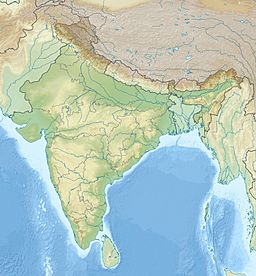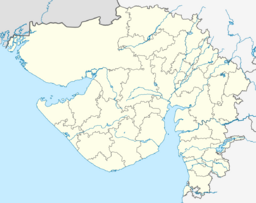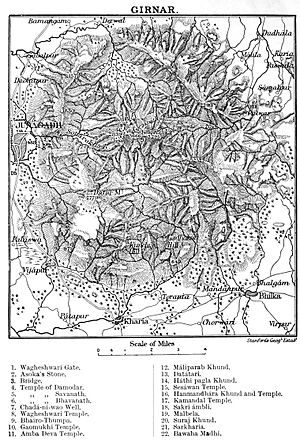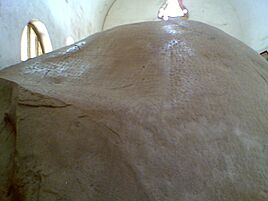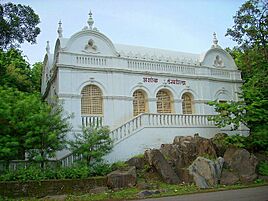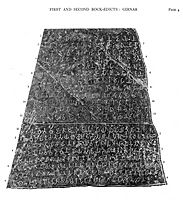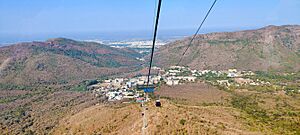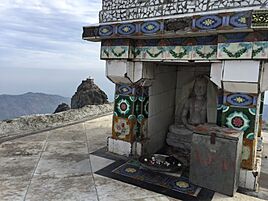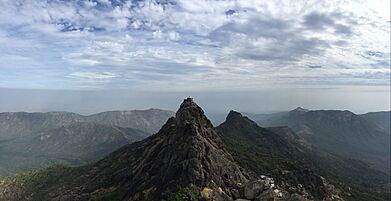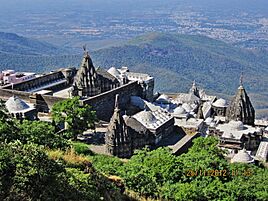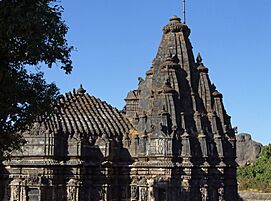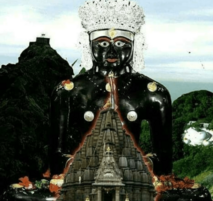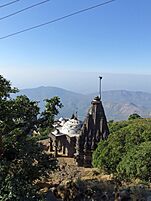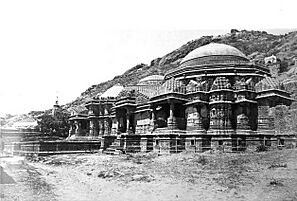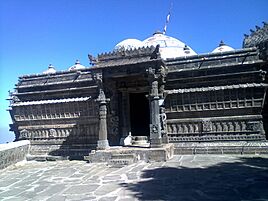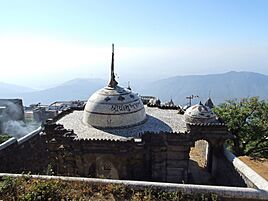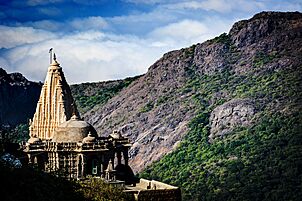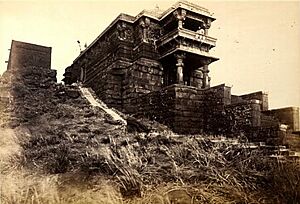Girnar facts for kids
Quick facts for kids Girnar Mount |
|
|---|---|
| ગિરનાર પર્વત Revatak Parvata |
|
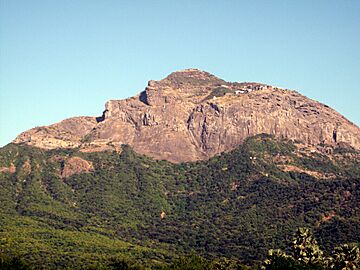
Mount Girnar
|
|
| Highest point | |
| Elevation | 1,069 m (3,507 ft) |
| Listing | List of Indian states and territories by highest point |
| Geography | |
| Geology | |
| Mountain type | Igneous |
Girnar is a very old and important hill in Junagadh, Gujarat, India. It's a special place for many people because of its history, temples, and beautiful nature.
Contents
What is Girnar Made Of?
Mount Girnar is mostly made of igneous rock. This type of rock forms when hot, melted rock (magma) cools down and hardens deep inside the Earth. It pushed its way into other rocks, like basalt, a long time ago.
Girnar's Long History
Ancient Messages from Ashoka
On a large rock near Junagadh, you can find special messages called Ashoka's Major Rock Edicts. These messages were carved around 250 BCE, which is about 2,270 years ago! They are written in an old script called Brahmi script, similar to the Pali language. These carvings mark the start of written history for Junagadh.
Later, around 150 CE, another ruler named Rudradaman I added his own messages in Sanskrit. His carvings tell the story of a lake called Sudarshan Lake. It was built or fixed by him, but then a big storm broke it.
Even later, around 450 CE, another message was added by Skandagupta, one of the last emperors of the Gupta Empire.
A building was put around these important carvings in 1900 to protect them. You can also see smaller copies of these Girnar messages in the National Museum and the Parliament Museum in Delhi.
Girnar Ropeway: A Ride to the Top
The Girnar ropeway is the longest ropeway in Asia! It was first suggested in 1983, but building it took a long time because of approvals and legal issues. Construction finally began in September 2018.
The ropeway opened on October 24, 2020. It is 2,320 meters (about 1.4 miles) long. It takes people 850 meters (about 2,788 feet) up the hill to the Ambaji temple in just 10 minutes.
Holy Places: Temples of Girnar
Hindu Temples
At the very top of Girnar, you'll find the Guru Dattatreya Temple. On the path between the Ambika temple and the Dattatreya temple, there's also a Gorakhnath temple. As you go down the mountain, there are two more temples called Bharat-van and Sita-van. These are named after Sita and Bharata from the ancient Indian epic, the Ramayana.
-
Dattatreya Temple of Girnar
Jain Temples
Girnar is also home to many important Jain temples. These temples are a significant pilgrimage site for Jains.
Water Tanks and History
Near the Kumarapala's temple, there's a large water tank called Bhima Kunda. It measures about 70 feet by 50 feet. There's also a smaller tank nearby.
According to history, a minister named Sajjana built the Neminatha temple using money from the government. When he tried to pay the money back, the king said no. So, the money was used to build the temple instead.
The main statue in the Neminatha temple today is of Sahastraphana Parshwanatha. This statue was placed there in 1803 CE. The temple used to have a golden statue of Mahavira and brass statues of Shantinatha and Parshwanatha.
This temple faces east and has 52 smaller shrines around the main temple. The ceilings inside have beautiful carvings. The temple has been renovated many times over the centuries.
Starting the Girnar Trek
The base of the mountain, called Girnar Taleti, is about 4 kilometers (2.5 miles) east of Junagadh city. There are many temples and holy places along the path to the base.
To get to Girnar Taleti from Junagadh, you pass through the Wagheshwari Gate. Close to this gate is the Temple of Wagheshwari. You'll also find an old Verai Mata mandir and a modern Gayatri Shakti Peeth mandir nearby.
A little further, after crossing a stone bridge, you'll see Ashoka's Major Rock Edicts on a large black rock.
After the edicts, you cross a bridge over the Sona-rekha river. Then you pass many temples, including the largest one dedicated to Damodar, another name for Krishna. The reservoir here, called Damodar Kund, is considered very sacred.
Next is an old shrine of Bhavnath, a form of Shiva, close to Girnar Taleti. The Mrigi kund and Sudharshan lake are also nearby.
Many people who don't want to climb can take a swing doli (a kind of chair lift) up the mountain from Taleti. The paved path starts just beyond this point and goes up for about two-thirds of the climb. Along the way, there are resthouses where climbers can take a break.
Ambika Temple: A Place of Worship
The Ambika temple was built a very long time ago, probably before 784 CE. An old inscription from 1192 CE mentions a minister named Vastupala visiting this temple. He even placed statues of himself and his brother Tejapala inside.
The temple has been restored and rebuilt over many centuries. It is considered a holy place for both Hindus and Jains, showing the unity of their faiths in Girnar.
Girnar Festivals
The biggest event for Hindus is the Maha Shivaratri fair. It happens every year in the Hindu month of Magha. Over a million pilgrims visit this fair to take part in prayers and walk around Girnar hill.
The procession starts at Bhavnath Mahadev Temple. It then goes to different groups of sadhus (holy people) who have lived in Girnar for a long time. The fair ends back at Bhavnath temple after visiting other holy spots. This fair is very important for the economy of Junagadh, bringing in a lot of money in just five days.
See also
- Girnar Jain temples
- Radha Damodar Temple, Junagadh
- Sacred mountains of India
 | Precious Adams |
 | Lauren Anderson |
 | Janet Collins |


